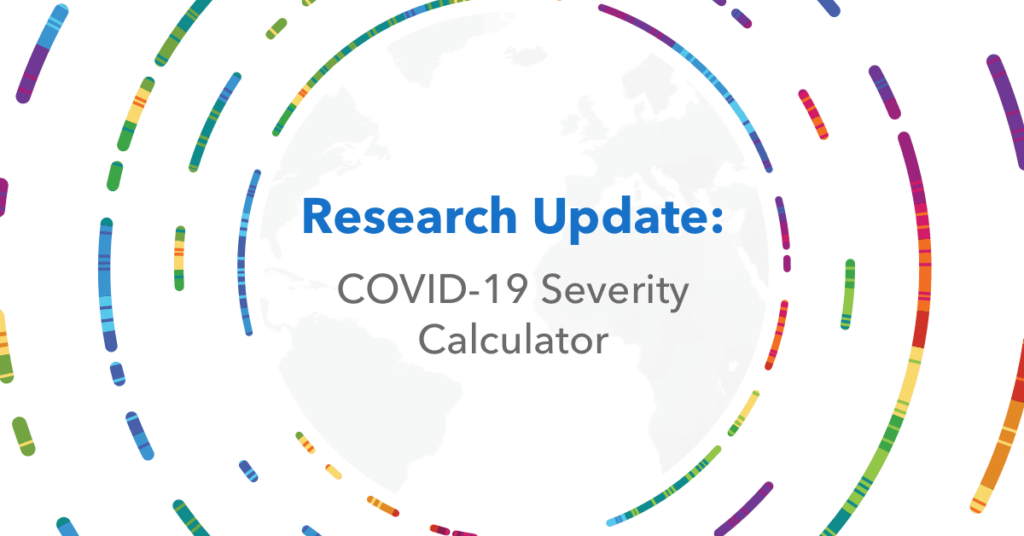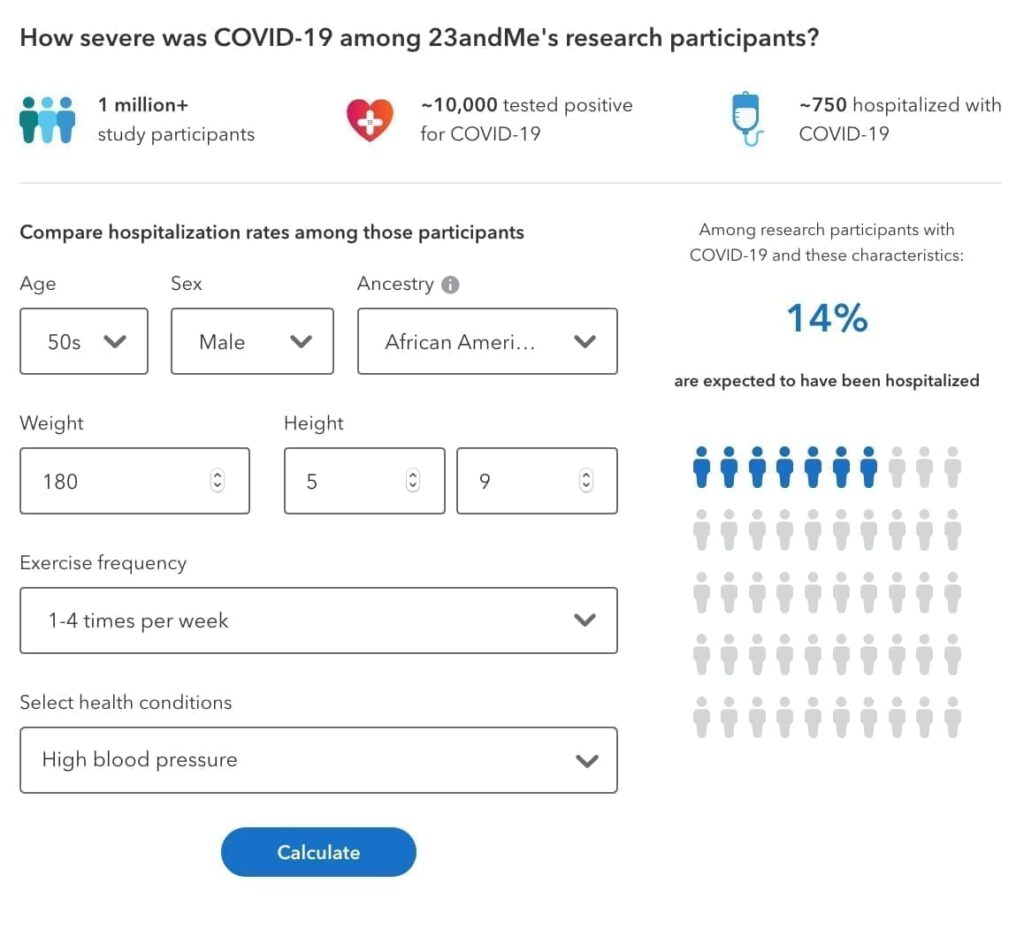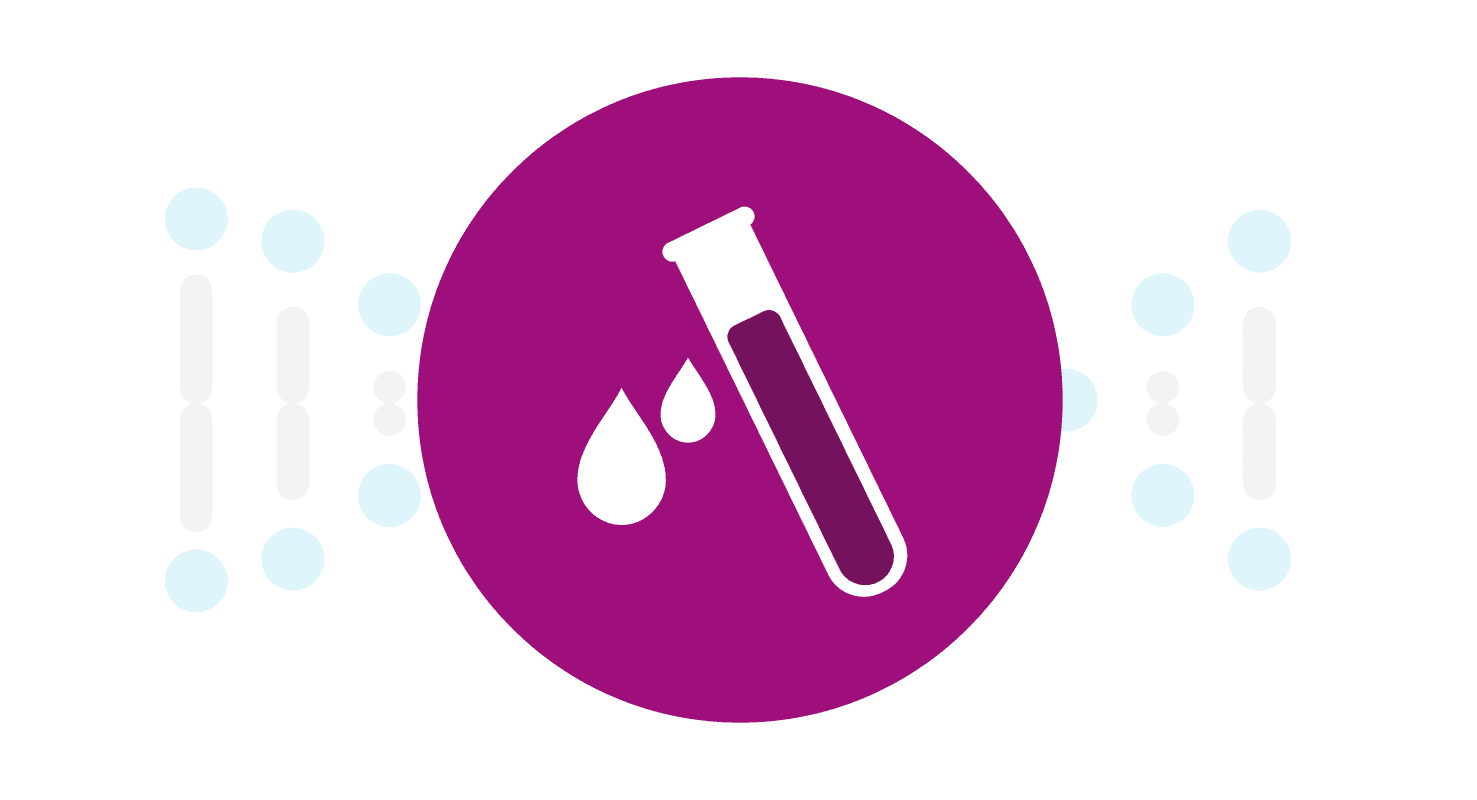Using insights from 23andMe’s COVID-19 Research Study, our scientists have created a new interactive tool to help people better understand factors that contribute to a higher risk for hospitalizations due to the virus.
The COVID-19 Severity Calculator* allows people to see how certain non-genetic factors may impact the risk for hospitalization due to the virus. Using only data from 23andMe customers who consented to participate in our COVID-19 Research Study — and no data from outside sources — the tool looks at such things as age, exercise frequency, and health history, which may contribute to the likelihood of hospitalization from contracting the virus.

More Information
“We created the Severity Calculator because people who have visited 23andMe’s COVID-19 Information Center have consistently been asking for more information about the severity of the virus infection and what factors into why it impacts some people harder than others,” said Janie F. Shelton, Ph.D., MPH, a Senior Scientist at 23andMe who worked on the COVID-19 Research Study.
“In addition to publishing our COVID-19 study results for the benefit of the greater scientific community, we wanted to look for additional ways in which people could utilize insights gleaned from our research,” Janie said.

Insights into Risk Factors
That desire to learn more about the virus and its potential impact has only grown in the last few months as cases continue to surge. While the COVID-19 Severity Calculator offers insight into factors that contribute to the risk for hospitalization from the virus among 23andMe research participants, it is not meant to be used as a predictor for a person’s individual risk for severe COVID-19 symptoms.
And no matter what the result, everyone should absolutely maintain the precautions and protocols implemented by local, state, and federal health officials. It does not predict a person’s individual risk for hospitalization. It also does not look at all possible factors that can impact the chances of being hospitalized due to COVID-19.
Research Data
Our research, and other studies, have shown that genetics does play an important role in the susceptibility to the virus and the severity of the disease. Last fall, our scientists published findings from the COVID-19 Research Study that showed associations between both the ABO blood group and genes involved in the immune response and COVID-19 susceptibility or severity. But the study also found that non-genetic factors play a significant role.
The COVID-19 Severity Calculator looks only at those non-genetic factors. The Severity Calculator enables individuals to input some of those non-genetic factors. It then uses statistical modeling to estimate the likelihood of hospitalization. The statistical modeling uses data collected from more than a million people who participated in the 23andMe COVID-19 Research Study. Of those who participated, nearly 10,000 were diagnosed with the virus, and nearly 750 were hospitalized with severe symptoms.
Using the COVID-19 Severity Calculator highlights how certain underlying health conditions like obesity and type 2 diabetes significantly increased the risk for hospitalization for COVID-19. For example, our data showed that research participants with the virus who exercised at least once a week were almost 20 percent less likely to be hospitalized than those who did not exercise. In addition, our study found that simply being overweight increased the risk for hospitalization by about 34 percent over those with a normal body mass index among those participating in our study.
The COVID-19 Severity Calculator can illuminate how a few underlying health conditions might factor into hospitalizations due to the virus. However, it does not take into account all factors that might increase the likelihood of hospitalization.
*The data powering this tool is from 23andMe consented research participants and does not represent the general U.S. population. There are also biases in the data that could affect the model. For example, individuals who died after being hospitalized for COVID-19 are not included in the data set, leading to an underestimate of hospitalization rates. This tool also does not include all possible factors that can impact the chances of being hospitalized due to COVID-19. This tool does not consider personal genetic information, nor does it predict any individual person’s chances of being hospitalized if they become infected with the coronavirus. Estimates are not available for people younger than 20 or older than 90, or for specific ancestries other than European, African American, or Hispanic, or Latino because sufficient data is not available. The strength of the associations in this tool may vary by geographic region or date of infection over the course of the pandemic. Two demographic inputs to the statistical model — median income per ZIP code and education level — are held constant at their sample median and mean, respectively.




